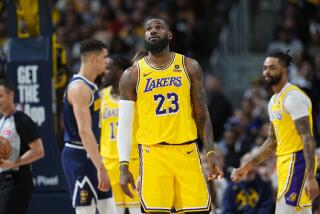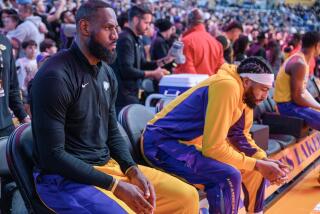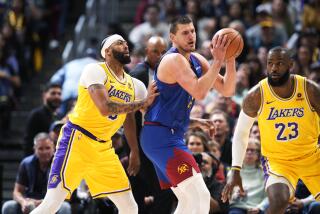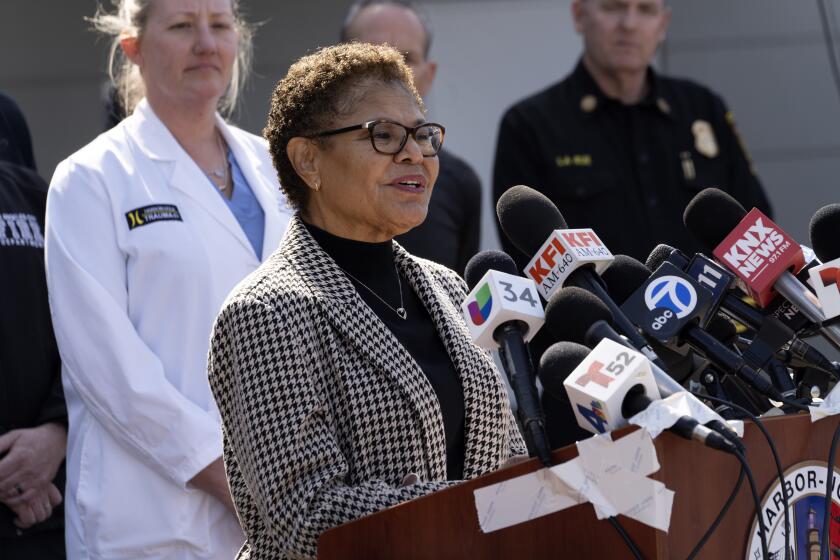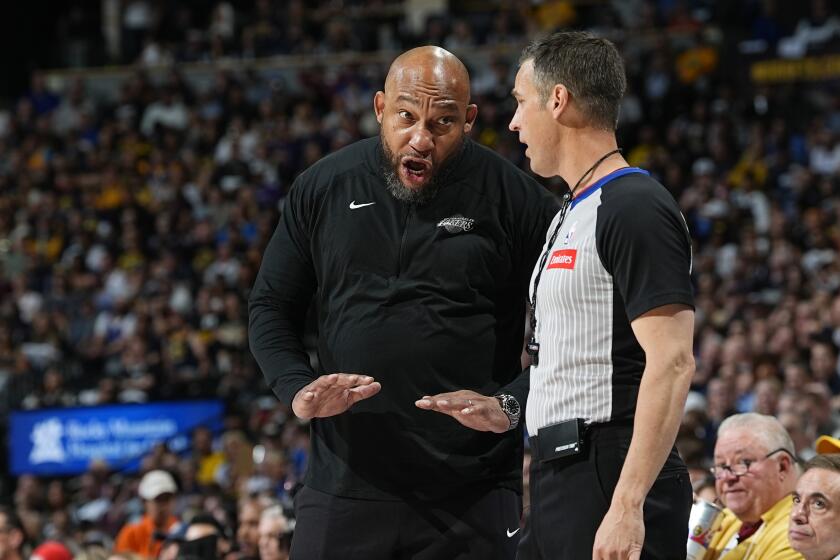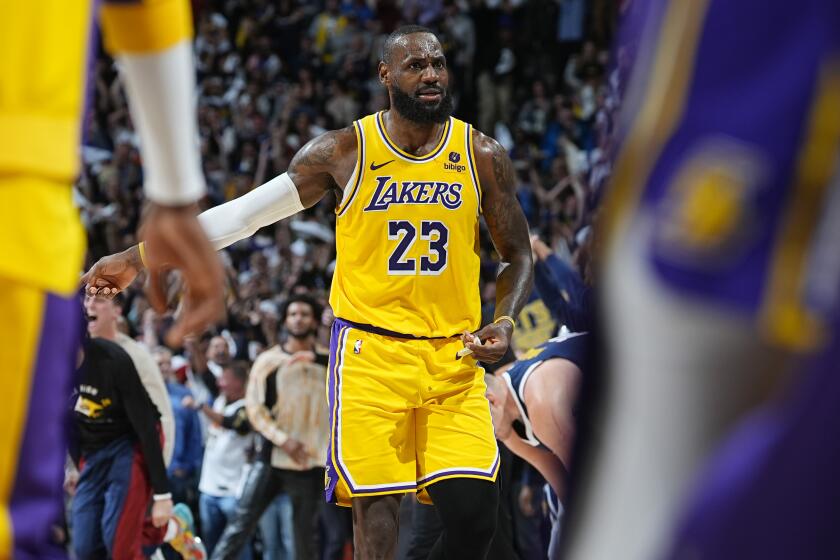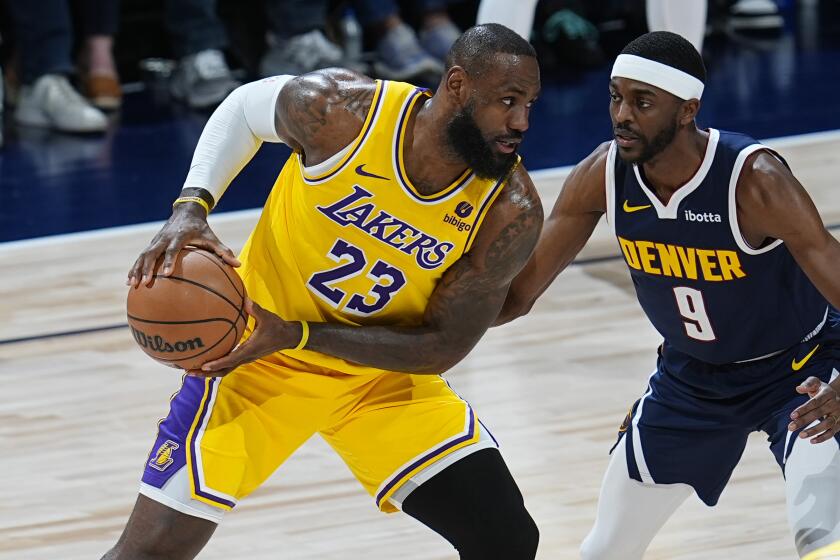‘Cow Town’ Cool
It’s an hour before game time at Sacramento’s Arco Arena, and the faithful have gathered for battle. Cowbells dangling around their necks, their hair dyed purple and black, they carry hand-painted signs with a simple message: “Beat L.A.”
No matter that the Los Angeles Lakers have arrived for this mid-January game without three of their best players—Shaquille O’Neal, Kobe Bryant and Karl Malone, all sidelined because of injuries. To the 17,317 spectators sardined into one of the nation’s most intimate pro basketball arenas, the short-handed Lakers are still the hated—the dreaded—team that has eliminated Sacramento from the playoffs three of the last four years.
On this night the Kings roll to an easy win. To the locals, the victory is meant to be savored—like strawberries in winter, to paraphrase sportswriter Red Smith. Many fans refuse to go into the chilly Northern California night. Instead, they flock courtside and surround Gavin Maloof, a stubby, boyish-looking man who co-owns the team with his brother Joe. Women who are Saran-wrapped into extra-small T-shirts and powder-blue Von Dutch baseball caps brazenly proffer their cellphone numbers. Teens in oversized Chris Webber jerseys line up to get Maloof’s autograph. Others drape themselves around him and pose for photos. Maloof’s companions urge him to hustle to the post-game party he is hosting, but he is in no hurry.
“It’s always good to beat ‘em and get the win,” he yells above the din. “Now our fans go home happy, and that’s what Kings basketball is all about.”
The brothers Maloof—they’ve become so ubiquitous that their names might as well be “JoeandGavin”—are among the most prominent faces in the state capital, even more popular than a bodybuilder-turned-actor-turned-governor named Arnold. Since 1999, when they paid $247 million for majority ownership of the Kings and Arco Arena, they have transformed a moribund franchise that was once the laughingstock of the league into its most exciting team. Couple that with their ownership of the Palms Casino, perhaps the hippest hot spot in Las Vegas, and Sin City sizzle has come Sacramento—and perhaps, next, to Southern California. The Maloofs are in negotiations to buy the Anaheim Mighty Ducks of the National Hockey League.
They did so with two ingredients. First, they peddled something most fans believe sank beneath the waves in the era of sports franchises owned by faceless conglomerates—customer service. They give out their mobile-phone numbers not only to cute women but to every fan who approaches them. They created a new department to field complaints from season ticket-holders. Oh, and those long waits in beer lines? Gone, thanks to new beer stands throughout the arena. The Kings were ranked No. 1 in overall fan experience by a survey conducted for the NBA by J.D. Power and Associates.
Also, they managed to transplant their perpetual adolescent, “boys gone wild” personalities to the marketing image of their team. Joe is 48, Gavin is 47, and both are resolute bachelors. Their jet-set lifestyle includes dating models, driving Ferraris, and high-stakes gambling. While Lakers owner Jerry Buss represents Hugh Hefner and the Playboy generation, the brothers have crafted a public image that personifies the party animal bravado of Maxim magazine and Coors Light commercials.
With appearances on Howard Stern and Oprah and profiles in Cigar Aficionado and elsewhere, the Maloofs have emerged as sports-entertainment’s trendiest taste-makers. Fans who go to Kings games feel like they’re part of the Maloofs’ hip scene—and as far as the Maloofs are concerned, they are.
“The Maloofs very much understand not just marketing and customer service, but the current culture as well,” NBA commissioner David Stern says. “They’re unique in that approach.”
“Business is their game,” says Greg Brown, who runs an Albuquerque, N.M., beer distributorship owned by the Maloof family, which includes three other siblings and their mother, Colleen. “If it helps business to have a playboy image, so be it.”
It’s Saturday afternoon at the family’s casino in Las Vegas, and the effects of a late night are apparent. Gavin had dined with Dallas Mavericks owner Mark Cuban at the Palms’ ultra-chic restaurant, N9ne, watched New York Giants tight end Jeremy Shockey play blackjack in the high-rollers room, then partied with Hall of Fame outfielder Reggie Jackson, Buffalo Bills quarterback Jim Kelly, ‘N Sync’s Lance Bass and a bevy of Oakland Raider cheerleaders. Joe had planned an early night, but he eventually joined in.
Looking slightly bedraggled, Joe devours a slice of blueberry pie while Gavin polishes off chicken fillets and mashed potatoes. They occasionally turn to watch the big-screen TV showing an NFL playoff game. (Because of the Maloofs’ ownership of the Kings, the casino’s sports book does not take bets on NBA games.) Cellphones ring intermittently as the crew makes security preparations for the night’s celebrity guests: rappers Eminem and 50 Cent.
The casino is still recovering from the hysteria surrounding Britney Spears’ short-lived marriage—and ensuing annulment—that followed a night of drinking at the Palms’ Ghost Bar. The boutique hotel is far removed from the old-school Vegas of Sinatra and Rat Pack cool, and even further from the late-’90s Vegas of family-friendly theme casinos. What the Palms offers is the intoxicating aroma of pop celebrity, a place where Paris Hilton can mingle with the cast from MTV’s “The Real World” (shot at the Palms’ 28th-floor suite).
While the Kings are run by Joe and Gavin, the franchise as well as the Palms and all other holdings are owned by the family. Younger brother George, the brains behind the Palms, runs the casino’s day-to-day operations. Brother Phil is a former state senator from New Mexico who helps with promotions and lobbying. Sister Adrienne lives in Beverly Hills with her husband and baby boy; she contributes marketing and philanthropic ideas. Matriarch Colleen, still the glue who holds everyone together, also lives in Beverly Hills.
“We’ve been through a lot of wars together,” says Joe, who, with blond highlights and a weathered, husky voice, resembles actor Gary Busey. “We look toward each other and to mom. When we come up with an idea, we bounce it off each other. When we all agree, there’s a good chance that it’s going to work.”
“The family works together as a team,” Kings president John Thomas says, “and they play together as a team. They work through whatever issue is at hand and out of the discussion—sometimes it’s arguing, sometimes it’s brainstorming—they come to a decision.”
Refreshingly, they eschew corporate-speak. They claim not to have a company “vision” or “mission.” Rather, Joe likes to say that they are in the “fun business,” with holdings in sports, gaming and booze. Combined with their stake in San Francisco-based Wells Fargo—they are reportedly the largest non-institutional shareholders—they’re laughing all the way to the bank. Forbes estimates their assets at more than $1 billion.
The origin of their wealth is beer. Grandfather Joe Maloof emigrated from Lebanon at the turn of the 20th Century and landed in the hinterlands of Las Vegas, N.M. There he ran a general store. In the 1930s, he landed the local distribution rights to Colorado-based Coors beer. It launched the family’s fortune. When Joe suffered a heart attack in 1944, his oldest son George took over, gaining the Coors distributorship for the entire state. Charismatic and hard-driving, the elder Maloof parlayed that into an empire that featured hotels, a trucking company and majority interest in the First National Bank in Albuquerque. (Through a series of mergers after his death, the family ended up with Wells Fargo shares). He met his wife, Colleen, at a liquor convention when she was 19 and he was 29.
George was chairman of the state racing commission and the New Mexico branch of the U.S. Olympic Committee, as well as a staunch Democratic Party supporter. He encouraged his five children to play sports, and all four brothers played college football, while Adrienne excelled at tennis.
The father also tutored his children about business. He ran his companies with twin-pillar philosophies: “We cater to the customer” and “Hard work never killed anybody.” Joe and Gavin remember hauling beer kegs as teens; their siblings worked the front desk at the hotels. “The biggest misconception about us is that all this was given to us, that we’ve been spoiled our whole lives, which we haven’t,” Joe says. “We’ve worked hard since we were 10 years old. We loaded trucks. We swept out the warehouse. We didn’t get anything handed to us.”
On a trip to Milwaukee, Joe remembers his father saying, “‘Let’s keep track of all the people we run into and see who goes out of their way to cater to us, Maloof-class.’ We came in contact with 57 people—bellman, taxi drivers, flight attendants—and out of the 57, there was one waitress who really went out of her way to service us like we were part of her family. That made a big impact on me.”
Gavin says they learned customer service from their grandfather. “People came from all over the state to buy goods from him. They would buy enough provisions to last them six months. So every single person was important: If you lost one customer, you lost six months’ worth of business.”
The family’s entrée into professional sports came in 1979, when George Maloof purchased the NBA’s Houston Rockets for $9.5 million. The following year, he built the Classic Hotel in Albuquerque, what was to be his flagship property. Soon after it opened, he suffered a heart attack and died. He was 57. He left behind a reported $125 million-a-year empire and a bronze statue of himself in downtown Albuquerque.
At the time of their father’s death, Joe was 25 and Gavin 24. Their siblings were teenagers. They could have cashed out and retired, but with mother Colleen at point, they decided to keep their holdings together. Yet George Sr.’s two sisters were part of the business at the time, and they wanted it sold. They filed suit.
In the heavily masculine environments of beer, banking and professional sports, Colleen was seen as a liability by everybody but her children. “Everybody came at my mom and told her, ‘Sell, sell. You’re a woman with a young family,’ ” Joe says. “Without my mom we wouldn’t have a business, if you want to know the facts. She raised a family and had enough respect for my father and what he built to keep it going.”
Colleen remembers flying to Colorado to meet with Joseph Coors—and found a sympathetic ear. “He told me, ‘Go back home to your business and your kids and don’t worry about anything,’ ” Colleen says. “He said, ‘We’re here if you need our support.’ We’re Democrats and they’re Republicans, but they’ve been great to us.”
The family lawsuit dragged on for a decade before George Sr.’s immediate family bought out the aunts. During this fractious time, the family sold the Rockets for about $12 million. Their timing was horrible: the Magic Johnson-Larry Bird rivalry had rejuvenated the NBA, while Stern’s skills as commissioner would help elevate the league into an international marketing juggernaut. With the Rockets now worth a cool $250 million, it’s no wonder that Colleen calls the sale “the biggest mistake we ever made.”
“The rest of the family—especially my aunts—couldn’t stand the thought of us paying [Rockets center] Moses Malone $1 million a year,” Gavin says. “So we said, ‘We’ll sell it, go back to New Mexico and concentrate on our core businesses.’ ” He chuckles. “The day after we sold the Rockets we were looking for another sports team.”
The experience taught them a lesson—to be wary of anybody but immediate family and trusted advisors. Joe estimates that it took him “about a decade” to come to grips with his father’s legacy and to feel confident about his own business acumen. In the early 1990s, with the legal disputes settled, Colleen and her children branched out with investments that have paralleled George’s original direction. Joe and Gavin bought a liquor distributorship and expanded their beer lines to include Corona. (They’ve since sold the liquor part.)
Young George studied hotel management at the University of Nevada Las Vegas. In 1989, he persuaded the family to purchase land in Las Vegas for a casino, but it took them five years to get construction financing. The family eventually signed personal guarantees to raise the necessary $30 million. Built in northern Las Vegas, far removed from the Strip, the Fiesta Casino was a winner as soon as its doors opened. Maloof hit on an innovative strategy: He concentrated on the locals market, luring them with a lavish buffet and “loose” slots that paid off better than the norm. “The casino still wins money,” says Anthony Curtis, editor of the Las Vegas Advisor newsletter, published for casino consumers. “But instead of gutting people fast, it bleeds them slowly.”
After two expansions, the family sold the Fiesta for $185 million in 2000, then used the proceeds to build the $265-million Palms. This time around, Maloof had a grander vision: He would merge the locals-only concept of the Fiesta with an off-the-Strip hideaway for young celebutantes looking to party.
Despite opening just two months after the Sept. 11 terrorist attack, the casino was a hit. Opening night festivities featured Paris Hilton in a million-dollar corset made of casino chips. The master stroke was persuading MTV’s “The Real World” to produce its show in a specially built suite, giving the casino instant “cool” status among the highly coveted youth audience.
The Palms is uniquely chameleon-like. By day, steady streams of locals feed the thousands of video poker slots and watch movies at the 14-screen theater; by night, a frothy mix of sports, music, and film hipsters turn the Rain nightclub and the Ghost Bar into gossip-magazine fodder. Curtis, who likens George Maloof to a contemporary Steve Wynn, describes the scene as “the blue-hairs meet Hollywood.”
Michael Morton, co-owner and operator of N9ne, Rain and Ghost Bar, says, “We’ve developed the funnest hot spot in Las Vegas because George is driven to succeed. He is here night and day.”
Maloof estimates pretax profits at $50 million. (“The Real World” suite now rents for $10,000 on weekend nights.) The casino will expand later this year, adding another tower of rooms and more private space for celebrities to romp. George pooh-poohs criticism that his “flavor of the month” casino cannot survive current trends. “Not long ago, you had the president of the United States addressing the nation, with 11 million people watching him,” he says. “That same night, you had Paris [Hilton] and Nicole Richie debuting their reality show on Fox, with 12 million people watching. People are fascinated with both celebrities and reality TV.”
The family has turned down offers to star in its own reality show, citing privacy concerns. Actually, they may be having too much fun for network television. Only sister Adrienne is married; each of the four brothers denies having a steady girlfriend. “I used to nag them about getting married,” Colleen says, “and then I noticed they started to avoid me. So I stopped doing that. Whatever happens, happens.”
“They enjoy their time being single,” Adrienne says. “It doesn’t look like they’re ready to settle down soon.”
Close friends say that they’re too focused on work—and having too good a time—to slow their pace. “Being too busy—well, that’s a good excuse,” says Joe. “I tried to use that for about 10 years. I had a girlfriend for a while, but it didn’t work out. Now I don’t have a girlfriend, so you have to march on.”
As other elements of the family business rolled forward, Joe and Gavin yearned to return to the sports world. They spent the 1990s hunting for a pro franchise. They can no longer recall every team they bid for, but the list included the NBA’s San Antonio Spurs, a National Hockey League expansion club in Houston, and the Texas Rangers (before a fellow named George W. Bush bought the team).
In 1997, as they negotiated to buy the NHL’s Tampa Bay Lightning, Newport Beach-based real estate developer Tony Guanci introduced them to John Thomas, majority owner of the Sacramento Kings and partner in the L.A. real estate firm Maguire Thomas. In 1998, the Maloofs agreed to purchase a minority interest in the Kings, then bought out Thomas in 1999. Most observers hooted—and not just because they paid top dollar. The Kings had been perennial NBA doormats since the team, formerly the Kansas City Kings, moved to Sacramento before the 1985-86 season. Worse, with Sacramento seen as a provincial hick town, the team was shunned by NBA players, the majority of whom are African American.
This time around the Maloofs’ timing was sublime. They inherited Geoff Petrie as general manager, and the former Portland Trail Blazers star has an eye for talent. In 1996, Petrie drafted a scrawny 19-year-old named Peja Stojakovic, now the NBA’s best pure shooter. In 1998, he traded for Chris Webber, an NBA star player. In 2001, Petrie acquired steely Mike Bibby, son of USC basketball coach and former UCLA star Henry Bibby.
“When I played with Denver, we’d come in here and blow ‘em out,” Kings guard Bobby Jackson says. “The Maloofs changed the image real fast.”
Without meddling in the day-to-day operations, the Maloofs have backed up Petrie with big bucks. They built a $9-million training facility adjacent to Arco Arena, a major upgrade for a team that practiced at the local Y. They signed Webber and Bibby to $123 million and $80 million seven-year contracts, respectively, demonstrating their commitment to winning.
“They’ve brought a lot of resources to bear, not just economic,” Petrie says. They did it “with energy and enthusiasm and a strong belief that we can create a winner here.”
By 2002, the Kings had joined the NBA’s elite, good enough to challenge the Lakers. L.A. coach Phil Jackson decried Sacramento as a “cow town.” Fans responded by shaking their cowbells at him. Shaquille O’Neal, ever the wordsmith, dubbed them the “Sacramento Queens.”
Then came the playoff series that cemented the rivalry: a best-of-seven face-off in 2002, with the winner going to the NBA finals. Each team won three games before the Lakers finally prevailed in overtime of Game 7. But the most dramatic moment occurred in the fourth game, as Laker forward Robert Horry threw in a three-point shot at the buzzer, giving the Lakers a come-from-behind win.
“I felt like I was shot in the stomach,” Gavin says.
“I asked [former UNLV coach] Jerry Tarkanian, ‘When do you think we’ll get over this?’ ” Joe says. “He said, ‘You’ll never get over it. Not until you win your first title, and then you still won’t get over it.’ ”
Last season, many sportswriters picked the Kings to win the NBA title. But Webber suffered a knee injury during the playoffs, and the team never recovered. This season, despite Webber’s being sidelined until late in the season, the Kings have one of the best records in the NBA.
For the family, owning the Kings has become “the ultimate labor of love because it’s become part of their sense of self and identity,” says the Kings’ Thomas. That spirit has trumped the efforts of major corporations such as Disney, Time Warner, and News Corp., all of whom trumpeted “synergy” as the reason behind their ownership of professional sports teams. But those efforts largely failed—with their fans and shareholders alike harshly critical.
The Maloofs, on the other hand, have used the Kings and the Palms to build their own brand, customer by customer. “They have helped change the perspective of owners as sit-in-the-luxury-box hidden faces to out-in-front faces of the organization,” says Cuban, who has cultivated an image similar to the Maloofs’ in Dallas. “Their fans and customers know exactly where the buck stops, and that is critical to the success of any business.”
Already, the Maloofs are looking ahead to next season, when the Kings will play two preseason games in China against the Houston Rockets, whose star center is Yao Ming. “The Maloofs approached us with an idea about staging a concert in Tiananmen Square, and we’re busy at work with that concept,” says NBA Entertainment president Adam Silver. “They are among the most creative and passionate owners in the league.”
Despite their incessant bonhomie, this has been a difficult winter for the brothers. In January, their Uncle Phil—one of the family’s last links to their father—suffered a heart attack. Joe quit smoking cigarettes, and he and Gavin curtailed their nonstop travel to stand vigil. Phil’s eventual recovery notwithstanding, the episode was a not-so-subtle reminder that heart disease (and premature death) are part of the family legacy.
The Maloofs also have made some moves that are distinctly not fan-friendly. Claiming that their cable television carrier, Fox Sports Net Bay Area, was low-balling them, the brothers refused to sign a new contract, leaving the Kings without a cable deal. Not only did they forfeit millions in revenue, but their fans now see fewer games on television.
Absent a cable contract, the Maloofs have threatened to start their own 24-hour regional sports network, which would feature the Kings and the Sacramento Monarchs, the Women’s National Basketball Assn. team they own, as well as minor-league baseball and college sports.
In addition, the Maloofs are beginning to campaign for a new arena. But in this they are on the defensive. Arco, privately built in 1988 for about $40 million, is already the third-oldest facility in the NBA and lacks many of the amenities—fancy eateries, plentiful club seats, plush luxury suites—that are de rigueur in NBA arenas and, not so incidentally, boost club revenue. To counter this disadvantage, the Maloofs have raised average ticket prices “from the bottom third of the NBA right into the top five overall,” according to the Sacramento Bee.
In 2002, Mayor Heather Fargo proposed the creation of a sports and entertainment district in downtown Sacramento, anchored by a $300-million arena. To pay for it, the state Legislature passed and former Gov. Gray Davis signed a bill to enable bars and restaurants in the newly formed district to levy a surcharge for food and beverages. The Maloofs were to contribute about 20% of the arena costs.
But businesses balked, and an embarrassed Fargo was forced to withdraw the proposal. By then the Maloofs were taking heat for having made a $100,000 contribution to Davis’ campaign in the recall election. Critics said they had bought the governor’s support. The brothers deny it. “We did it because he’s a Democrat and it was just a donation,” Joe says. “It had nothing to do with the timing.”
The Maloofs also supported former presidential candidate Dick Gephardt, who had campaigned for their brother Phil during his unsuccessful run for the U.S. Congress in New Mexico. Gephardt campaigned as staunchly pro-union, an embarrassing twist given that the Maloofs have fought off unionization efforts among culinary workers at the Palms.
As for their future outside the Kings, the Maloofs are trying to buy the Anaheim Mighty Ducks from Disney, which last year sold major league baseball’s Anaheim Angels, its other major sports team. The Maloofs are also about to launch their own record label with Interscope Records, and they have a television production deal with MGM in the works. The two deals are high risk, however. NHL franchises are losing money these days, and the record industry is in dire straits.
On the other hand, “if they were to get involved with the Mighty Ducks at a bargain-basement price, they could use their presence in Orange County to promote their Las Vegas property,” says USC sport-business professor David Carter. “It’s a natural fit.”
A confidentiality agreement signed with Disney prevents the Maloofs from talking about specifics. But whatever they do, they say they will rely on their father’s business tenets to guide them. Outside of their third-floor offices at Arco Arena, a photograph shows a near-empty stadium the year after the Florida Marlins won the 1997 World Series. It serves as a daily reminder, Joe says, that a team’s popularity can wither overnight if an organization ignores its fans.
“We stay awake at night worrying about that,” he says. “We feel that that’s why we were put on this earth, to cater to people. The customer’s happiness—it’s life or death for us.”
More to Read
All things Lakers, all the time.
Get all the Lakers news you need in Dan Woike's weekly newsletter.
You may occasionally receive promotional content from the Los Angeles Times.
